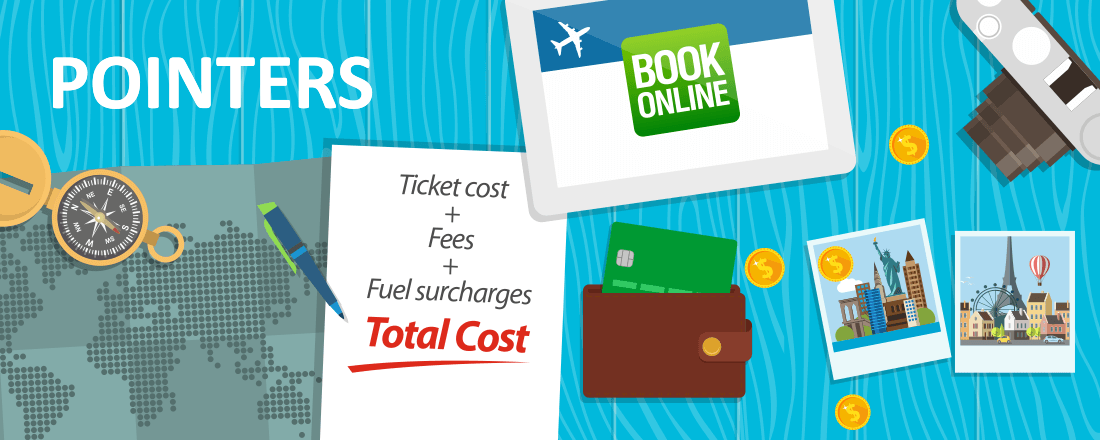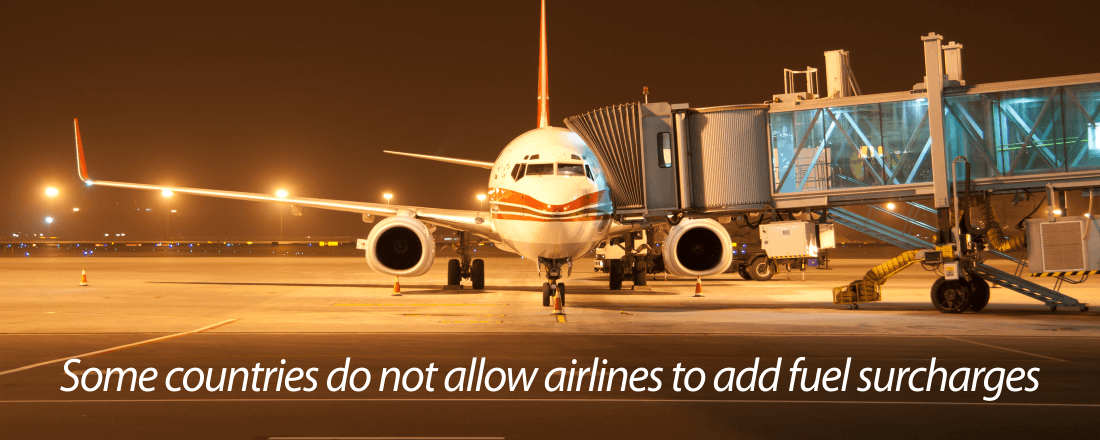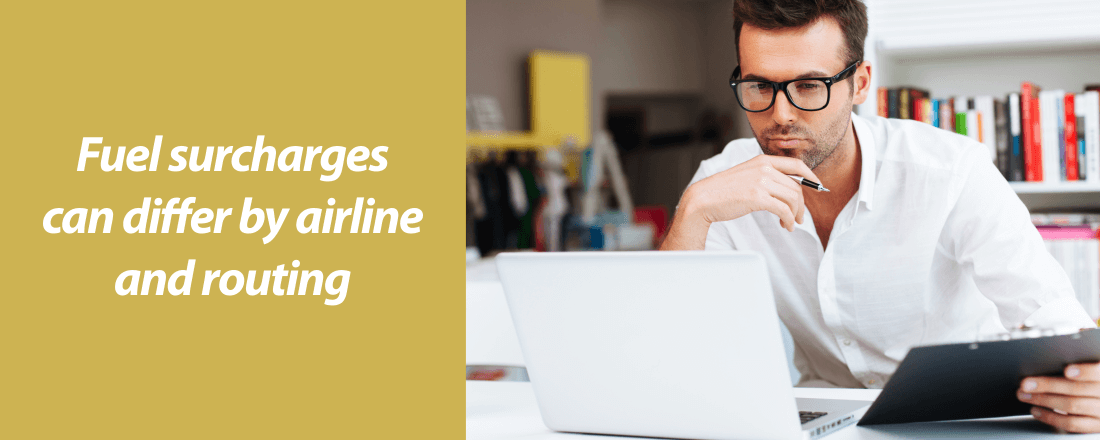
Beware of fuel surcharges when booking a flight, whether you are using
Fast forward to 2015. Oil prices have bottomed out so many expected that airlines would do something about fuel surcharges. Some simply changed the name of the fee.
- Air France and British Airways call them “carrier-imposed surcharges.”
- Delta renamed it a “carrier-imposed international surcharge.”
- Lufthansa calls them “international or domestic surcharges.”
Some other carriers, mindful of the irony of imposing fuel surcharges in the day and age when crude oil prices are at 15-year low have changed the name, too. But not the practice.
Regulators Weigh In
Some countries have prohibited the practice of adding surcharges for a long time, like Brazil, where airlines are not allowed to add fuel surcharges for flights leaving the country.
Other countries have outlawed them too in the recent years, like China (on domestic routes) and the Philippines. Public pressure and scrutiny have contributed to some airlines dropping fees, like SAS, Virgin Australia and AirAsia. Air Berlin got rid of fuel surcharges in Europe and on its flights to Israel. And even British Airways replaced fuel surcharges with a small flat fee within Europe.

Yet, Air India has recently increased fuel surcharges for flights to the U.S. by $80, and Qatar’s CEO has announced plans to revise fuel surcharges as well. They will likely go up.
Among countries where fuel surcharges are allowed, Japan is probably the only one where fuel surcharges are regulated and really tied to the cost of fuel. This is why Japan’s two largest carriers, ANA and Japan Airlines, aren’t imposing fuel surcharges right now, but as the price of fuel continues to climb, they will likely reintroduce them.
In any case, fuel surcharges are not going away any time soon. And they are incredibly confusing, not only because they vary widely between carriers, but also because the surcharge amounts added by airline programs to partners’ flights are unpredictable. Let’s take American Airlines, for example.
- American doesn’t add fuel surcharges to its own flights.
- And Japan Airlines doesn’t add any surcharges to American.
- But British adds fuel surcharges to American flights to and from Europe, and so does Cathay Pacific.
If that weren’t confusing enough, the fuel surcharge added to the same airline can differ from one partner airline to another. And sometimes, a fuel surcharge can depend on the routing and the mix of other airlines used to book the award. This is what can make planning an award difficult and you might not have any idea what your cash component would be until you’ve booked the ticket.

So while there are a lot of things we do not know about fuel surcharges, there are some things we do know that can help you choose wisely and save hundreds of dollars booking your award ticket.
Airlines in the Americas
Alaska, which runs a program called Mileage Plan doesn’t add fuel surcharges to partners except the following airlines: British Airways and Icelandair.
American, a oneworld Alliance member, doesn’t add fuel surcharges to most of its partners. The exceptions are: British Airways (except Europe) and Iberia. In fact, American adds so much to the price of the British Airways transatlantic and transpacific award tickets you’re better off not using it for many overseas flights. Between the U.S. and London, you’ll pay over $500 for a round-trip economy class ticket and close to $1,000 for flying in business. Avoiding British Airways, however, can be difficult, since American often pushes it to the top in its award calendar.
Iberia fuel surcharges are much more reasonable. You will pay close to $130 in economy and close to $150 in business for a round-trip award ticket.
Delta, a SkyTeam Alliance member has its own peculiar ways.
- It always adds surcharges to flights originating in Europe, including its own flights.
- It adds surcharges to Aeroflot, Aerolineas Argentinas (to Europe), Air Europa, Air Tahiti Nui, China Airlines, China Eastern, China Southern, Kenya Airways, and Middle East Airlines.
United, a Star Alliance member doesn’t add fuel surcharges to award flights at all. Well, that was easy.
Air Canada adds fuel surcharges to most of their own flights and many of their partners’, such as: Adria, Air Canada, Asiana, Egypt Air, Ethiopia, LOT, Lufthansa, TAP and Thai.
Airlines in Europe
Air France/KLM, SkyTeam member that also runs Flying Blue, adds fuel surcharges to its own flights and most of it partners except: AeroMexico, Alaska and Xiaman
Interestingly, British Airways, which adds huge fuel surcharges to its own flights, doesn’t add fuel surcharges to most of its partners. However, it does collect fuel surcharges on American (Europe only), Comair (BA’s South African Affiliate), Finnair, Iberia, and Qantas (except from Australia).
Virgin Atlantic which runs Flying Club adds fuel surcharges to most of its partners except: Cyprus Airways, Delta (other than originating in Europe), Hawaiian Airlines, Virgin America and Virgin Australia.
Airlines in Asia
ANA, a Star Alliance member, adds fuel surcharges to most of its partners except: Air Canada, Avianca, Copa, Etihad, Hawaian, LAN, and United. ANA doesn’t currently add fuel surcharges to most of its own flights, but it will begin collecting them again starting April 1, 2017. A flight between the U.S. to Japan, will incur a $43 fuel surcharge each way.
Cathay Pacific, a oneworld Alliance member, adds fuel surcharges to most of its partners, except: Air Lingus, airberlin, Alaska, American (except for flights to/from Europe), LATAM and Qantas (except for flights originating in Australia). Cathay Pacific currently doesn’t add fuel surcharges to its own flights, although it does add negligible insurance surcharges.
Japan Airlines, also a oneworld Alliance member, adds fuel surcharges to the following airlines: Air France, Bangkok Airways, British Airways, China Eastern, Finnair, and Iberia. Japan Airlines currently doesn’t add fuel surcharges to its own flights for travel originated outside of Japan, but it will reintroduce them again, starting April 1. The fee will be $43 one-way.
Bottom Line
Here are some data points to keep in mind when you research your award ticket.
U.S. to the Americas
No fuel surcharges
U.S. to Europe
- There is always a fuel surcharge for flights on British Airways.
- There is no surcharge for airberlin.
- Both British Airways and Cathay Pacific add a fuel surcharge to American.
- Star Alliance airlines on a partner award: use United and Air Canada to avoid fuel surcharges. Use LOT and Turkish for lower fuel surcharges. Other European airlines have exorbitant fuel surcharges.
- Air Canada has a lot of partners with no fuel surcharges: Aegean, Brussels, Croatia, SAS, Swiss, Turkish, United.
- SkyTeam Airlines on Delta: use Delta and Air France to avoid fuel surcharges.
- Delta doesn’t add a fuel surcharge for Virgin Atlantic, and Virgin Atlantic doesn’t add a fuel surcharge to Delta.
U.S. to Asia
- American, United, JAL, and Cathay Pacific are great airlines to use to fly to Asia without fuel surcharges. Asiana is the next best thing that adds very moderate surcharges, mostly in double-digit numbers.
- ANA doesn’t have fuel surcharges to Japan and most destinations in Asia. However, it still adds fuel surcharges to some connecting flights from the U.S., such as Manila, Bangkok and Singapore.
- Keep in mind that starting April 1, 2017, ANA and Japan Airlines will again start adding a fuel surcharge to Japan ($43 one way).
Hopefully, this will make it easier to get your award ticket as close to free as possible.
